Norway and UK are neighbours, separated only by the North Sea, with its rich mine of oil and gas reserves, but whilst Norway has used its good fortune to become the richest country in the world. The UK’s oil bonanza was largely squandered, at the very least, the UK did little to invest proceeds. Norway invested the proceeds of oil in a sovereign wealth fund, which stands at $1.4 trillion, the biggest in the world.
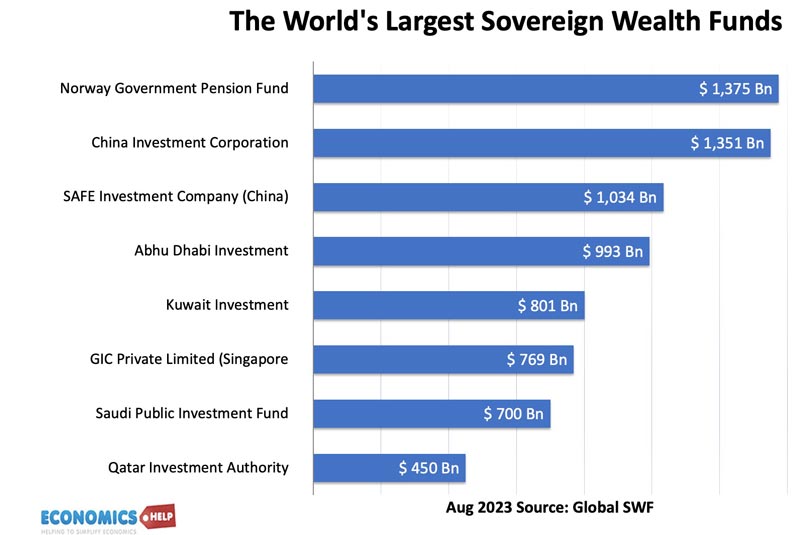
The UK has no wealth fund, but, it could have been very different.
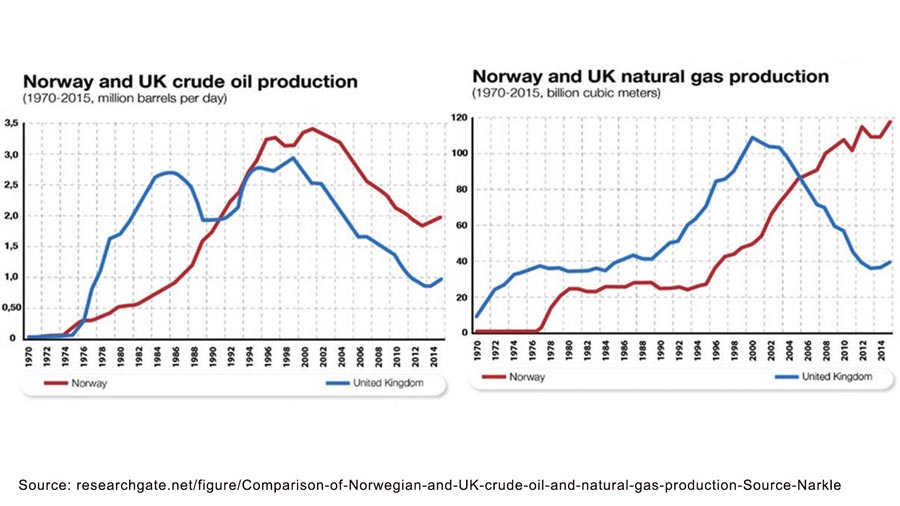
For many years, the UK produced more oil and gas than Norway, but the outcome couldn’t have been more different. Let’s see why.
Oil in the 1970s
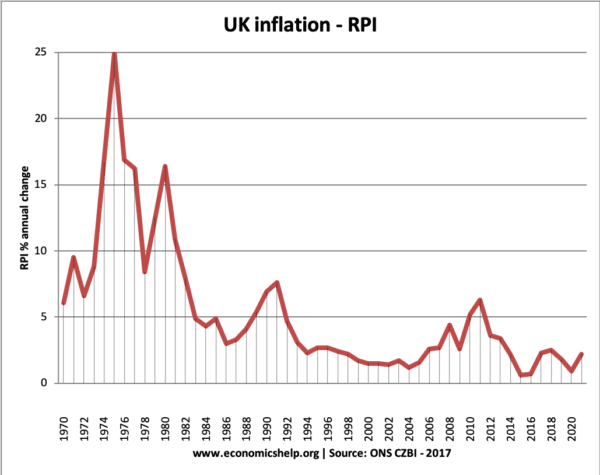
In the 1970s, the UK was reeling from high inflation, industrial unrest, poor growth and – embarrassingly for the once largest economy in the world – had to be bailed out by the IMF. Against this backdrop, the Labour Prime Minister James Callaghan declared that oil was “God’s gift to the British economy”. And it could well have been. For a time, the UK was one of the top 10 largest producers of oil and gas. But, here’s the strange thing about discovering oil. It can be a mixed blessing or even a curse. Many countries discover oil, but don’t benefit from it – the so called oil curse or the Dutch Disease. Venezuela, Iran, Libya, Nigeria, Russia. All countries with huge oil reserves, but failing economies. Striking oil is no guarantee of success. But Norway is widely regarded as a role model on how to actually benefit from an oil and gas bonanza. So how did Norway go from a small economy based on fishing and shipping to the richest in the world? And an important thing is that this is not just a sleight of economic statistics. Whichever method of measuring living standards you use, health care, education, low pollution Norway is doing very well.
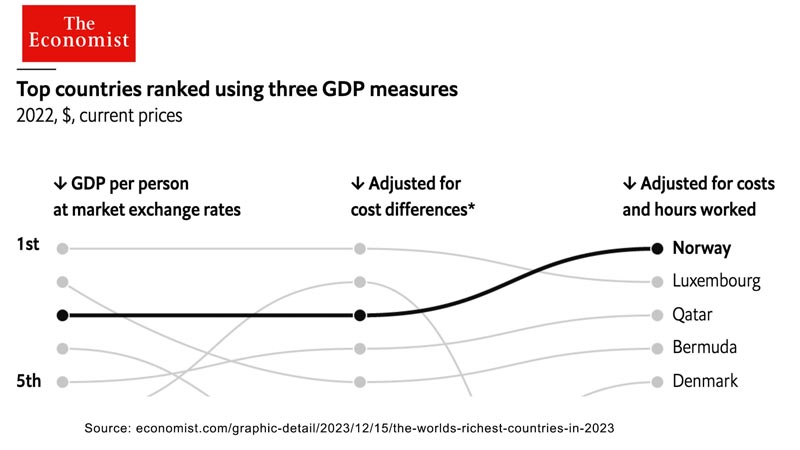
The Economist ranks Norway as the richest country in the world if you adjust for hours worked.
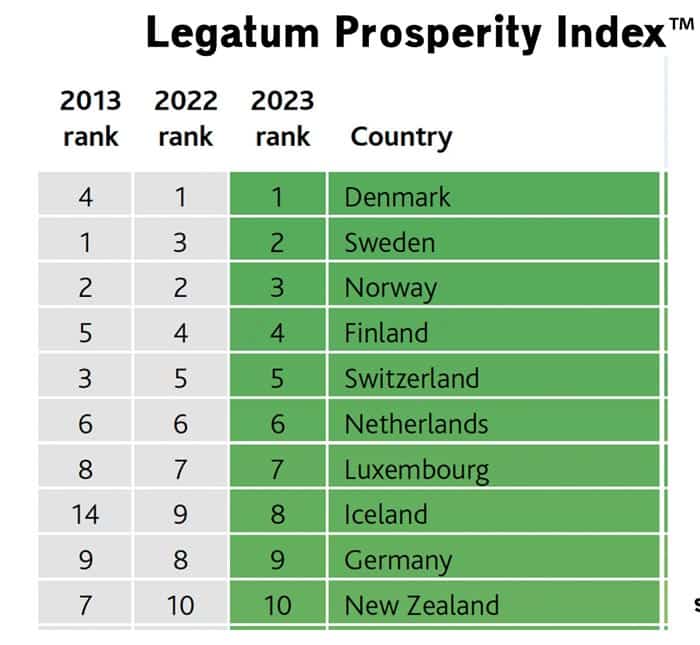
Legatum prosperity index measures, income, health, education, environment, public services.
Norway’s transition to richest country
Like many European economies, Norway suffered immensely in the great depression – mass unemployment and the rise of political extremism. In the post-war period, there was a strong motivation to build a more cohesive economy. They developed a comprehensive welfare state, education and health care. Taxes were one of the highest rates in the world. It was conscious decision to spread the proceeds of economic growth throughout society. In fact, there were similarities with the UK who also established a welfare state post Second World War.
Principles of Norway’s oil strategy
When oil was discovered in the late 1960s, the Norwegian government laid down the principle that oil should be used to make a “qualitatively better society” (link). The industry was put under democratic control with the government retaining 70% ownership of the oil fields and companies. But in the UK, the election of Mrs Thatcher in 1979 heralded a very different economic philosophy. Thatcher was an adherent of free market economics. The mantra of the government was to privatise. Britoil and BP were all privatised in the 1980s. And unlike Norway, it left the UK government with no direct ownership of oil and gas.
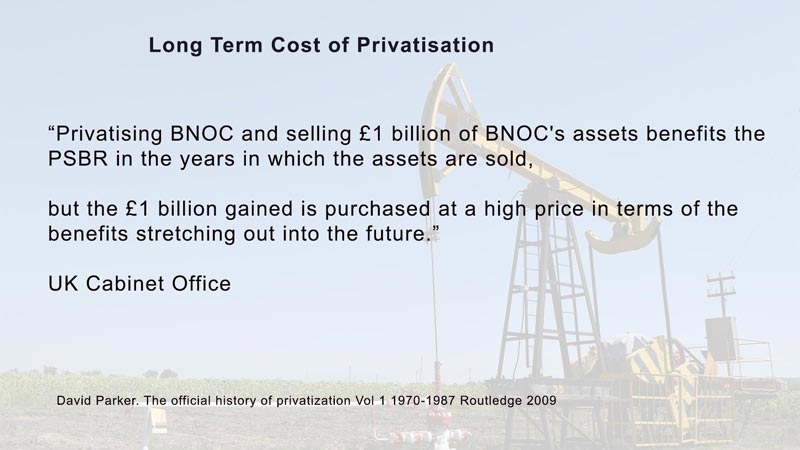
In 1980 the UK cabinet office warned privatisation of Britoil would raise $1 billion, but this short-term gain would be a very high loss in the long-term. Studies have suggested the UK missed out on at least $400bn of revenues if they had followed the Norwegian model of state ownership and higher taxation. Sukhdev Johal, professor of accounting at Queen Mary University of London, thinks the UK could have had a sovereign wealth fund of £850bn had the UK followed the Norwegian model. John Hawksworth who wrote the paper “Dude where’s my oil money?” suggested a more conservative £400bn, but that was in 2014. £850bn is around £13,000 per person or 33% of the UK’s national debt.
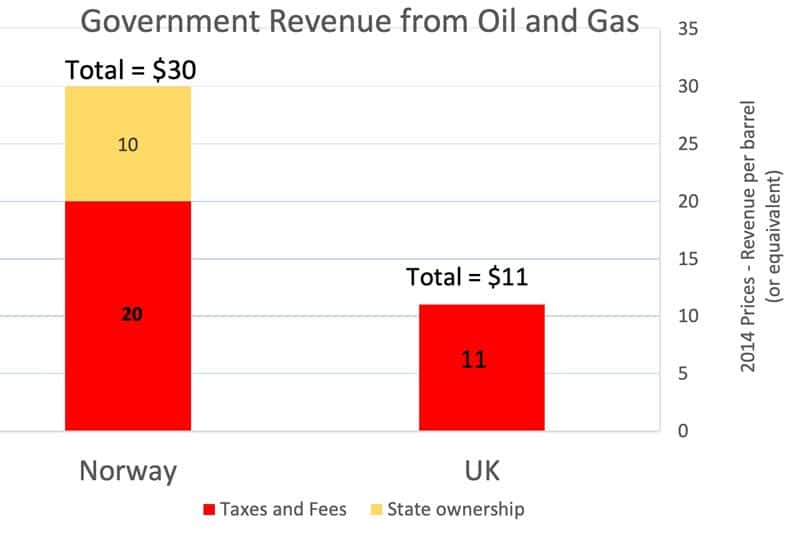
The National Resource Governance Institute argues that since 1970, the UK government received around $11 a barrel. By contrast, the Norwegian government was receiving $30 a barrel. The $19 extra per barrel explains why Norway received $1.2 trillion and UK tax revenues only $400 billion.
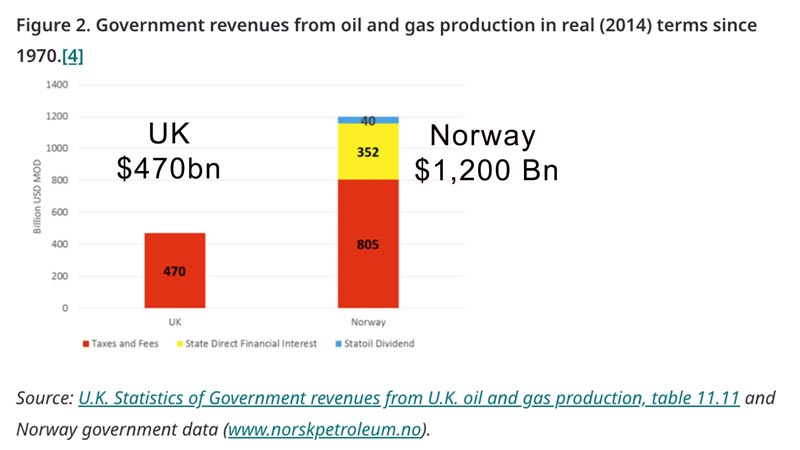
There are four reasons for lower tax receipts in the UK. Firstly the UK sold more when oil prices were low. Norway sold more when prices were high. Secondly, state ownership led to a steady stream of dividends for Norway. Thirdly, Norway had a higher tax on oil. The overall tax rate on oil in Norway is 78%. Until the recent windfall tax, the oil tax rate in UK has been around 40%. (Link) Fourthly, extracting oil from Norway’s bigger oil fields had a lower unit cost and therefore is more profitable.
Proceeds of Privatisation
Privatisation receipts in the UK during the 80s and 90s was around £67 billion. How were these spent? The main motivation of the government was tax cuts, in particular tax cuts for high earners.
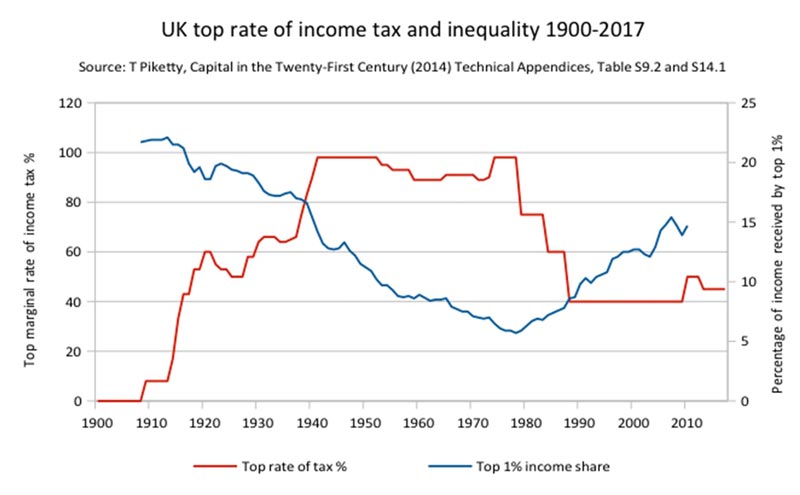
The 60% income tax rate was reduced to 40%. Corporation tax was cut from 52% to 33% in 1991.
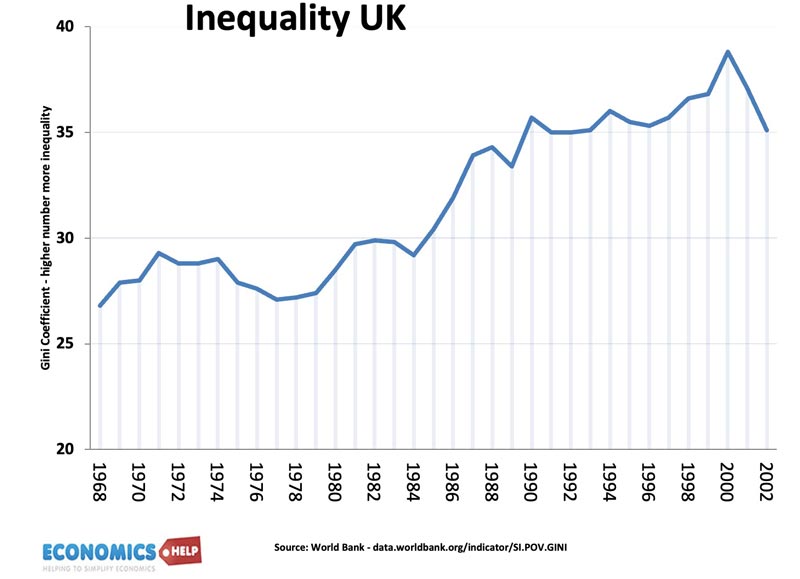
Combined with a rise in unemployment, and growth of the finance sector, the 1980s saw a surge in inequality with 33% rise in the gap between poor and rich. John Hawksworth, chief economist at PricewaterhouseCoopers who wrote a paper called “Dude, where’s my oil money?” suggested that a lot of the boom in income for higher earners was invested in real estate causing a boom in house prices (link). During this period, social housing was also privatised, sold off, but despite a boom of oil tax revenues, there was no effort for long-term investment.
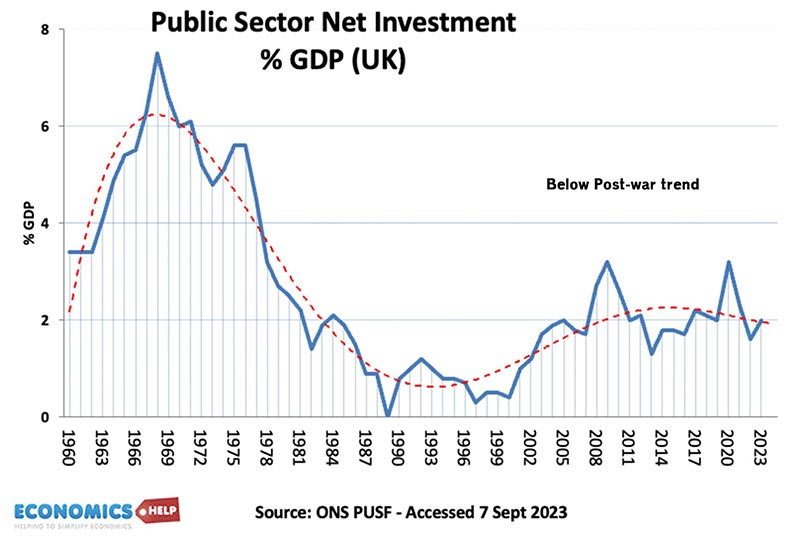
In fact, whilst taxes were cut, public sector investment was also cut from 4% in the late 70s to 1% in the early 1990s. Decisions which impact the economy today with shortages of housing.
Arguments for privatisation
The argument for Thatcher’s free market reforms and privatisation was that it would encourage entreprise and higher economic growth. There were some benefits e.g. privatisation of BT helped improve efficiency and lower prices.
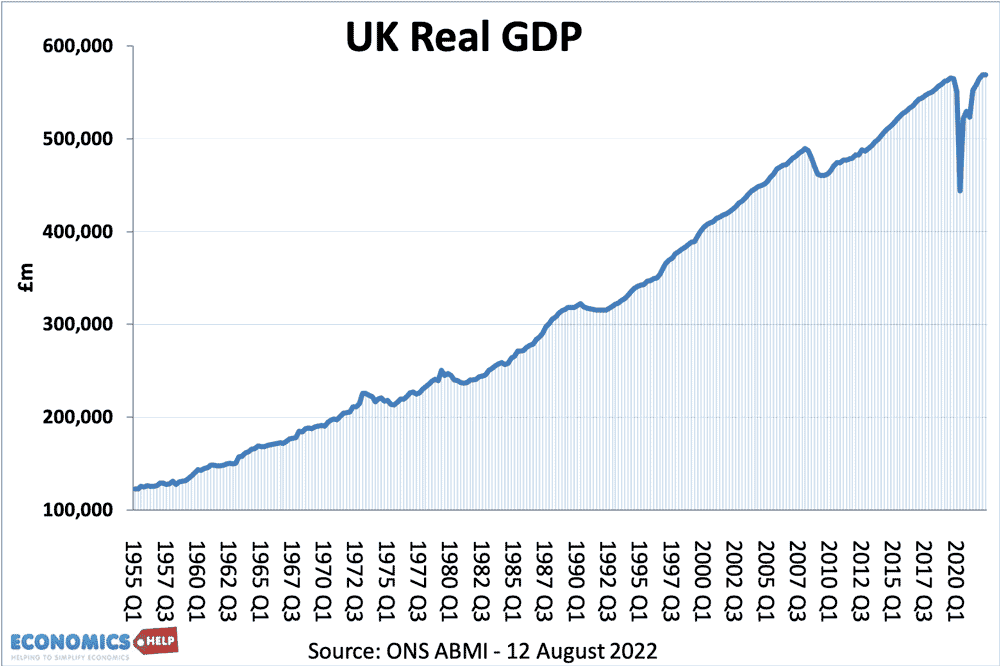
Economic growth in the 1980s was a mixed bag. Very high unemployment in the early 1980s, a boom in the late 1980s and then a recession at the end of the decade. The result was that economic growth in the 1980s was adequate, but relatively similar to every other decade. There was no economic miracle from tax cuts and privatisation. Oil didn’t damage the economy, but there was no lasting benefit.
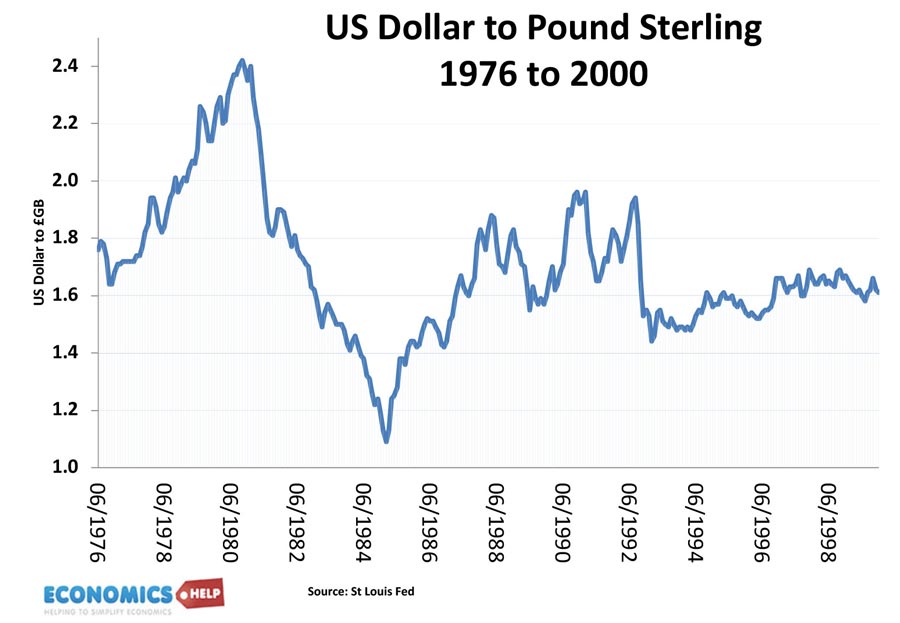
Though interestingly, you could argue the increased production of oil in the early 1980s contributed to a surge in the value of the Pound – at one point the £1 was worth $2.5, which crippled British exporters causing a devastating decline in British manufacturing in the early 1980s. This is one reason why oil can be a mixed blessing. But, one thing was clear, there was never any effort to really invest the proceeds of oil and gas in long-term projects beyond tax cuts.
Norway’s Sovereign Wealth Fund
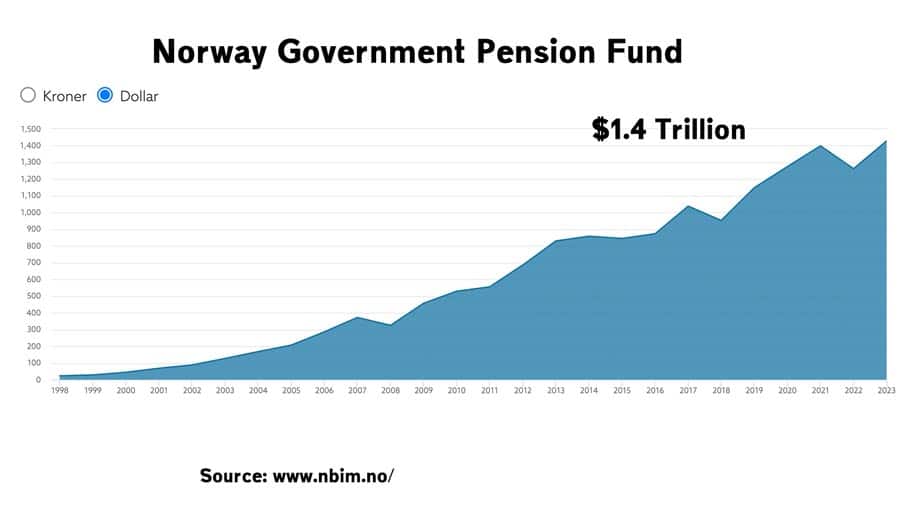
Norway took a diametrically opposite approach. The proceeds from oil would be invested for the future. Norway invested in companies outside Norway, including some real estate such as Regent Street in London. The investment had to meet ethical concerns, meaning Norway has an international clout beyond its small size.
It helped that Norway was more patient, there wasn’t the same hunger to finance tax cuts or provide short-term political benefits. They were also more patient with production, holding back during low prices, and avoiding a surge in the currency. The investment fund was specifically set up to be protected from short-term political pressures. The government could not spend the capital, but only spend a share of income from fund on welfare such as education and health care. This is the success of Norway, there was sufficient trust, strong government and desire to allow everyone to benefit from oil. This is the sharp contrast with other countries, where the proceeds are used like a Ponzi scheme to cut taxes, enrich a small number in government or allow most of profits to be gained by multinationals.
Outside the EU
Interestingly both Norway and the UK have had referendums to reject membership of the European Union. Ironically, the voting majority was almost identical 48:52. Yet, there was a huge divergence between the two countries on what independence from the EU meant. Norway has taken a very practical approach, joining the single market, customs union, and having near economic harmonisation. The UK took a 52:48 vote to go the other extreme, leaving the single market, and customs union. It’s another factor that has hampered UK economic growth in recent years.
Problems of Norway
Norway is not without its problems, it has one of the highest cost of living in the world. In recent years, like elsewhere in the world, the price of housing has soared, especially in Oslo.
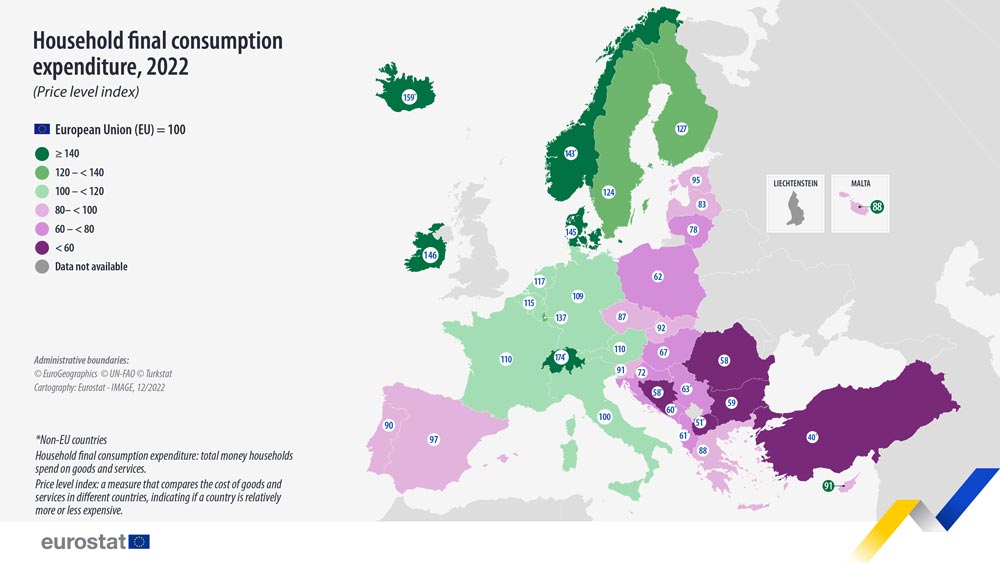
But even adjusted for cost of living, Norway has 2nd highest levels of consumption in Europe. Also, it has successfully invested in a post oil economy. It is a leader for renewable energy, electric cars and heat pumps. The UK made some progress with building wind farms in the North Sea, but the past few decades have still been a missed opportunity for investment in renewables and an updated power grid.
Some argue that Norway’s welfare state is overgenerous. It spends 4.3% on incapacity benefits, the second highest in the OECD behind Denmark. (It also makes Norway a good place, if you are ill and sick). But, whilst free-market think tanks like to warn about the disincentives of a welfare state, a highly educated and cohesive society, has many benefits for productivity, entrepreneurship and labour productivity.
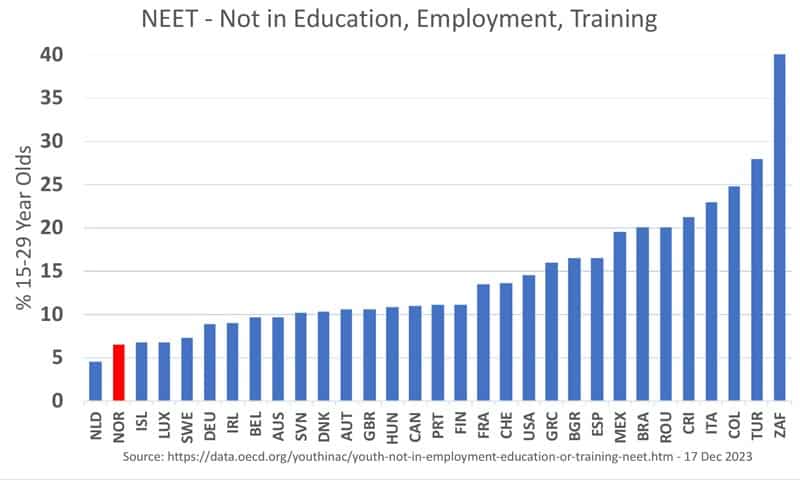
Norway has one of the lowest rates of NEET. It ranks in top 10 for ease of doing business. A real success behind Norway’s economic growth away from oil is a highly educated workforce. Norway has a number of IT startups and a booming service sector.
Per capita basis
One difference between the two countries is the size of the population. Norway 5 million, UK 67 million. This makes the oil revenues per capita much more significant for Norway. For example, with a sovereign wealth fund of $1.4 trillion, that makes $200,000 per person. The UK with 67 million, if the UK had a sovereign wealth fund of $850 billion, that would be around $13,000 per person. Nevertheless, there is a clear difference in approach. The UK could have set up a sovereign wealth fund to provide long-term benefits, even a pension fund of $13,000 per person would be very significant. Norway also has a slight advantage in that it has lower costs of producing oil from its fields.
Sources:
- Did UK Miss out $400bn?
- Norwegian oil tax
- UK Lost out on Oil
- Norway Pension Fund
- What happened to Scotland’s Oil?
- North Sea oil – a tale of Two Countries

and Denmark?
Well – Denmark has the second highest per-capita productivity in the world and amongst the highest in individuals satisfaction with life. Denmark has prioritised work/life balance and it would be concidered unthinkable for an employer to contact an employee about a work issue at the weeknd. Sounds good to me.
Another in the ongoing series “Why Britain is shit and what was responsible”
the stupidity of privatization that every neo conservative commentator ignores……
They will never admit that they got it wrong, Magaret Thatcher is a god to them, unfortunately the narrative is set by the right wing media and swallowed whole by the masses